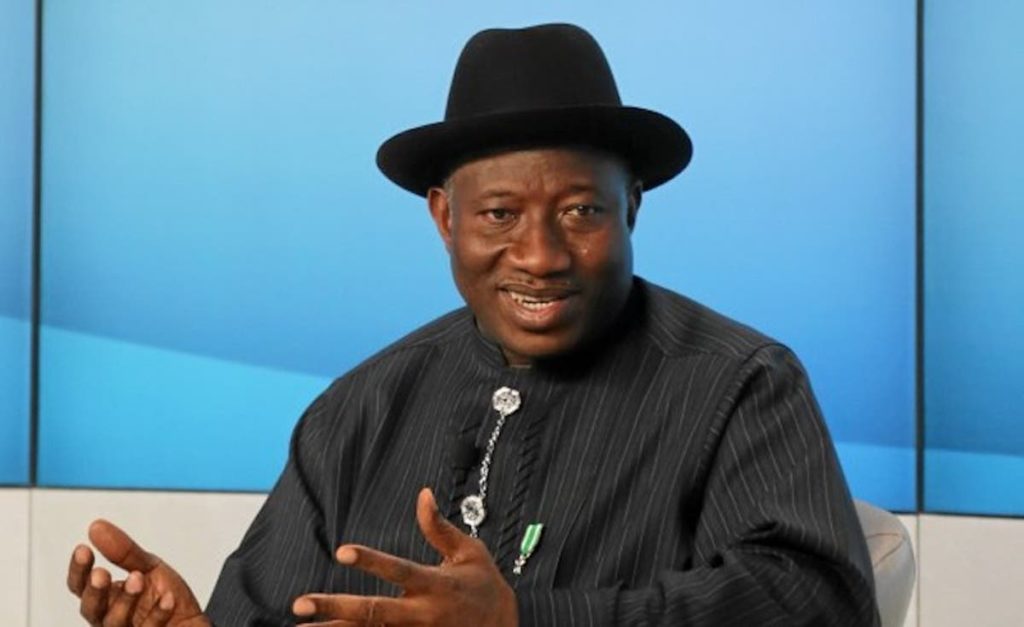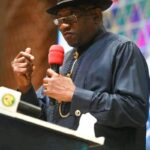Former President Goodluck Jonathan has urged candidates and other politicians alike to be mindful of the nation’s corporate existence and wellbeing of Nigerians in their campaigns and other electioneering activities for the 2023 general elections.
He gave the charge on Thursday in Abuja during the Annual Ibrahim Badamasi Babangida Legacy Dialogue.
According to him, it is also important for other Nigerians to shun apathy and indifference, but to positively participate in the nation’s democratic processes to choose the right leaders that would make Nigeria better and united.
“The forthcoming elections are critical to our national aspirations, shared prosperity and development. I urge our politicians to be mindful of our unity and stability and exercise discipline in their campaigns and other political activities.
“To the rest of us, this period does not afford us the luxury of indifference. We must be determined to participate in our democratic processes. It requires that we must mobilise to vote those who will manage the affairs of the country with honesty in order to guarantee peace, justice, unity and progress in our land,” Jonathan who spoke virtually said.
Sambo wants issue-based campaigns
On his part, former Vice President, Architect Mohammed Namadi Sambo, who was at the event urged candidates and stakeholders of the various political parties to adopt issue-based campaigns for the 2023 general election.
According to him, the 2022 dialogue put together by the Ibrahim and Maryam Babangida Presidential Library Foundation with the theme: ‘Issues in Africa’s Democratic Journey’, is unique and apt, especially as it comes ahead of another electioneering process scheduled for 2023 in the country.
Sambo, who served as vice president under Jonathan, said political stability in Nigeria’s democracy is as strategic as stability in Africa’s democratic journey.
The onetime Kaduna State governor said since the return to democratic rule in 1999, the nation has witnessed six successful elections, describing it as a clear indication of how acceptable democracy has become as the best method of governance in the country.
He said democratic institutions have continued to be strengthened, while more Nigerians have continued to participate in the process either seeking to lead or as active participants to elect their leaders at various levels of leadership. Sambo recalled that in December 2020, he led a 90-member delegation of the Economic Community of West African States (ECOWAS) Observer Mission to the Niger Republic to observe presidential and parliamentary elections in the country.
He said that the outcome of the elections were not only impressive, but a clear departure from the sit-tight syndrome of some past African leaders who never wanted to cede power through the democratic process.
“The recent elections in Kenya and some parts of Africa have also established evidence of Africa’s democratic journey as a continent and how democracy is taking firm root in Africa, but not without peculiar challenges.
“As we approach the critical stage towards the 2023 general election in Nigeria, it is important to use this opportunity to call on all political parties and indeed, candidates and other key stakeholders to adopt issue-based campaigns.
“We must all shun the use of hate or foul language and mudslinging to avoid overheating the polity. Peaceful, free and fair election next year will definitely mark yet another important milestone in our march towards sustainable democracy, peace and development of our dear nation,” Sambo said.
While urging Nigerians to actively get involved in the electoral process by exercising their constitutional rights, Sambo urged the Independent National Electoral Commission (INEC) to ensure adequate voter education and sufficient preparation for hitch-free elections.
He said, “Next year, by the grace of Almighty Allah, we shall witness another transition from one democratically elected government to another, Insha Allah. Nigeria must continue to get it right as a positive example for other countries in West Africa and indeed, beyond.”
FCT minister urges democratic sustenance
On his part, the Minister of the Federal Capital Territory (FCT), Alhaji Muhammad Musa Bello, said that it was imperative that governments and people across Africa work hard to sustain the demands of democratic governance across the entire African continent.
According to him, in Nigeria, the administration of President Muhammadu Buhari, building on the foundation laid by past leaders, including former President Babangida, has further entrenched democratic values in the country.
“The signing into law of the Electoral Act 2022 by President Muhammadu Buhari, has far-reaching positive outcomes that will also strengthen the confidence of citizens in our electoral processes, leading ultimately to a more stable polity,” Bello said.
In her welcome remarks, the Convener of the Ibrahim Badamasi Babangida Legacy Dialogue, and daughter of the former military ruler, Hajiya Aisha Babangida, said the event brought together, some of the finest minds in Nigeria to consider the prospects for the future of the nation as Nigerians look forward to next year’s transitional election.
She said, “Today is an opportunity to build on the success of last year’s maiden edition of The Ibrahim Badamasi Babangida Legacy Dialogue and to take forward, the ideas discussed there. But more than that, it is an opportunity to build on the wider legacy of progress towards democracy in our great nation as we consider the pressing issues in Africa’s democratic journey.”
Jettisoning IBB’s legacies fuel insecurity – Oshiomhole
Also speaking at the event, former Edo State governor, Comrade Adams Oshiomhole, said the jettisoning of some of the laudable projects of the Babangida administration, including the Nomadic Education Policy, by successive administrations, was among the major factors that led to the banditry, kidnapping and other forms of insecurity ravaging the country.
Oshiomhole, who is also a former National Chairman of the All Progressives Congress (APC), said that while he cannot say any leader has got everything right, it is true that some leaders including Babangida, managed to get some things rights, but succeeding leaders abandon those things.
“As a consequence, we have found ourselves taking turns and competing to cry for Nigeria.
We have failed to appreciate the fact that insecurity is a consequence. If we don’t deal with the causes of insecurity, we will keep repeating the same mistakes. If we had sustained IBB’s policy of nomadic education, some of the security challenges rocking our nation will not be as complex as they have become,” he said.
Oshiomhole countered some views expressed regarding zoning and power rotation saying it was not what Nigeria needs at the moment.
“You want to zone. Zone what? Zone the right to serve? It is your turn. To do what? There is some implied self-interest in the clamour for zoning or power rotation.
“People must understand that to be a technocrat doesn’t make anyone a competent leader. The qualities of leadership do not flow from the classroom, to be electable does not necessarily mean to be a technocrat,” he said.
What leaders must learn from IBB – Akilu
Also, a former Director of Defence Intelligence Agency (DIA), under the Babangida regime, Brig-Gen. Haliru Akilu (retd), said that Gen. Babangida was able to identify good hands to work with him and move the nation forward.
According to him, those appointed by the Babangida administration were selected based on merit devoid of religion or ethnic consideration, thus the successes recorded under the administration.

 Join Daily Trust WhatsApp Community For Quick Access To News and Happenings Around You.
Join Daily Trust WhatsApp Community For Quick Access To News and Happenings Around You.


